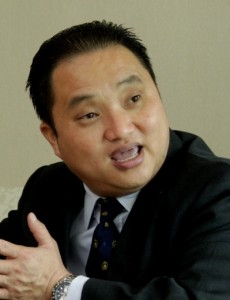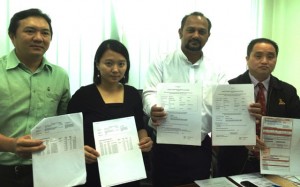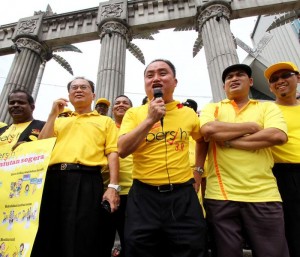By Syukri Shairi & Izmil Amri
 Ng Suee Lim is DAP Selangor state assemblyman, serving the agriculture-rich, mostly-rural constituency of Sekinchan. The animated Ng spends a lot of his time helping the people in Selangor well beyond his borders of constituency, and he’s happy about that. He shares his story with The Rocket – switching effortlessly from fluent Malay to eloquent Javanese – on his missions, and his beliefs.
Ng Suee Lim is DAP Selangor state assemblyman, serving the agriculture-rich, mostly-rural constituency of Sekinchan. The animated Ng spends a lot of his time helping the people in Selangor well beyond his borders of constituency, and he’s happy about that. He shares his story with The Rocket – switching effortlessly from fluent Malay to eloquent Javanese – on his missions, and his beliefs.
Please introduce yourself.
I’m Ng Suee Lim, member of the state assembly for Sekinchan, Selangor. I’m also the Deputy Secretary for Selangor DAP.
Tell us how you got involved with DAP.
My interest in DAP started when I was a Standard 6 schoolboy back in the 80s. I followed a lot of statements from YB Lim Kit Siang, and I was attracted to his notion of fighting injustice, his hope in giving birth to a fair and just Malaysia.
I used to follow my uncle, an avid DAP supporter, to talks and dinners. He noticed my interest and bought me tickets to political dinners. This was back in 1981 or 1982. I would translate the speeches for him because he was not conversant in Mandarin and Malay. This was how my interest in DAP grew.
In high school, I was vocal and spoke out against things. My history teacher labeled me as “opposition” – due to my frequent debates with the teachers, particularly about history.
During 1986 and 1990 elections, I started to help out with the party campaigns. Nothing much, just hanging banners and flags.
In 1998, during the unfair sacking of Dato’ Seri Anwar Ibrahim by Tun Dr Mahathir, I felt the call [to join in the cause] and I participated in all the demonstrations held.
How did you run for office in Sekinchan?
Back then I was DAP Kapar’s branch leader, a position I held since 1995. In 1999 general elections I was already active in following Ronnie Liu (now Selangor State Exco) and Teng Chang Khim (now Selangor State Assembly Speaker).
They nominated me to contest there [Sekinchan], for the sake of filling the empty seat. It was uncertain whether or not my nomination could even go through, because all the previous candidates didn’t want to contest there anymore — it was the bastion of UMNO and MCA.
I was living not far from Sekinchan at that time, I decided to take up the challenge. For me, losing or winning is a challenge. My candidacy was confirmed only three days before nomination day.
Back then Sekinchan only had one DAP branch, and all the members were reaching their 50s, there were no younger ones. They were also not confident, looking at my very young self, still only in my 20s back then.
Finally, the branch members went to Kuala Lumpur to meet Ronnie Liu and Teng Chang Khim, to tell them that they don’t want this candidate (myself), since they don’t know me and I ‘am not famous’.
There were fallouts. But in the end they relented to the party’s decision. They didn’t give me the fullest of help [at first]. After seeing that I was able to give speeches in Malay areas, using a bit of Javanese, the branch members’ dissatisfaction was reduced.
When the results were out, I lost by 2,044 votes, yet I won the votes of a Malay-majority area, in which was a first time [for the DAP]. My constituency was a mixed one: 42% Malays, 56% more of the Chinese and 2% Indians. The Malays were of Javanese and Banjar majority.
I thought we could have won back then in Sekinchan, but after that loss, we realized that more work must be done.
During the campaigning period, we engaged the voters, strengthened the machinery and added more members. Up until today, we will go on duty at least once a week, and in the middle of the month, we’ll hold dinners.
We go from house to house in the villages to sell RM30 tickets [for dinner ceramah]. There were bad responses at first, but things got better along the way. The initial 60 tables became 80, and the numbers are finally adding up. All these are done consistently every half of the year since 1999.
When the farmers are facing any trouble, we will come up and offer assistance, advocating any issues further and highlighting them in the press, especially those relating to the prices of wet items and the farmers’ affairs.
When Tun Dr Mahathir resigned from his post in 2003, a shift happened, a ‘blue wave’ occurred due to the tenure of a new prime minister [Tun Abdullah Badawi]. A wind of change was sweeping, everybody switched to support BN.
When the ‘blue wave’ happened in 2004, in Selangor, only YB Teng Chang Khim and myself won, with a majority of 344 votes. Nobody believed it.
That was a bit of my chronology, in my history of joining politics.
After 2008, how do you see the development, or the changes, from the aspect of Selangor state administration?
After four years of Pakatan Rakyat administration, under the leadership of Tan Sri Khalid Ibrahim, I have seen a lot of differences and development in Selangor. We are now at the right track, especially in terms of stable and firm financial management. We received a four star rating from the Audit Department. Development in Selangor is progressing, and the rakyat are much more comfortable due to the welfare given through Pakatan Rakyat.
The new concept for the government is that all people must enjoy the state’s diverse revenue, thus making the economy people first. Assistance for the people of Selangor has reached RM600 million – now reaching RM700 million for welfare programs, including the Senior Citizen Appreciation Scheme and the Bereavement Fund, each payout is valued at RM2, 500.
The initiatives have been well received everywhere. We are awarding University Entrance Gift of RM1, 000, alongside Selangor Children Heritage Fund (TAWAS) of RM1, 500; each — assurances for young Selangorians entering universities. The only thing left for them is to register.
There’s more: we’re rewarding parents with RM100 to shop for their children’s birthdays, provided that they have registered with TAWAS. We are also advocating People’s Tuition, for free. But now BN is trying to copy whatever we have done.
Selangor has been giving 20 cubic litres of free water to all people of Selangor since the last four years, and the micro amount is RM11.40. In Penang, under the leadership of Chief Minister Lim Guan Eng, we have practiced free Wi-Fi for the people of Penang. In Selangor, there’s free water; in Penang, there’s free Wi-Fi; but in Pahang? Free radioactive.
This is a stark difference. Before, we (Pakatan Rakyat) were accused of not having the experience to govern. Now, we’re showing that we can do it, from the concept of accountability of governance.
How is the planning and coordination by the DAP in Selangor, and what is the main focus of the election campaign?
The state DAP has been holding monthly meetings, chaired by Selangor DAP Chairperson, Teresa Kok to discuss areas that require attention or improvement. We were expecting the elections to be called on last June, but it seemed the Prime Minister was too hesitant to announce when would the elections be.
Our strategy is to launch counter-assaults on MCA areas, where they have been saying that we are not continuing to build Cultural Centres for the Chinese and Indians in Selangor. They are accusing us of not being concerned about the cultural affairs of the Chinese and the Indians.
However we have thought that it’s not fair to build cultural centres only for the Chinese and the Indians (though the Selangor state government has been working for a Malay-Muslim cultural program). So we worked on a Malay Cultural Centre too, and we have chosen the Klang river vicinity as the location.
Now we are able to handle attacks from our opponents better if not well.
What has the Pakatan Rakyat government in Selangor done to assist all communities in terms of education?

At a press conference highlighting the unpaid quit rent and assessment bill on UMNO Puchong’s lands for year 2011 and 2012
Funding matters for religious schools, Chinese type schools and Tamil type schools are also being consolidated in Selangor. Pakatan Rakyat has implemented an annual funding scheme, something BN has never done before.
Now, assistance from the Selangor state government for four private high schools is up to RM2 million per year. We are allocating RM4 million annually for the 108 Chinese type primary schools as well as RM4 million for the 92 Tamil-type primary schools.
The same goes with religious schools, in which during the Khir Toyo administration weren’t given any help or grants – in fact Tun Mahathir once instructed for religious schools to be shut down.
After Pakatan Rakyat took over, however, we have assisted the 256 religious schools, with a total of RM6 million per year. We are adding another RM2 million this year, so that means during the four years of Pakatan Rakyat governance we have provided RM8 million for religious schools. Allocations for Chinese and Tamil schools have also been increased.
So is DAP really fighting for the rights of all races, including the Malays?
I want to correct the perception that DAP is a racist party, since DAP is actually a multiracial party; it’s not a party championing the Chinese. We are a party that struggles for the all rakyat’s rights, and I won’t see any problem when, one day, a Malay democrat becomes DAP Secretary General. Even at the moment, our Chairman is not a Chinese, but Karpal Singh. -The Rocket





Hi, I am interested to join DAP Dinner on 26/4/2013
May I know the details & where to get tickets?
Thank you